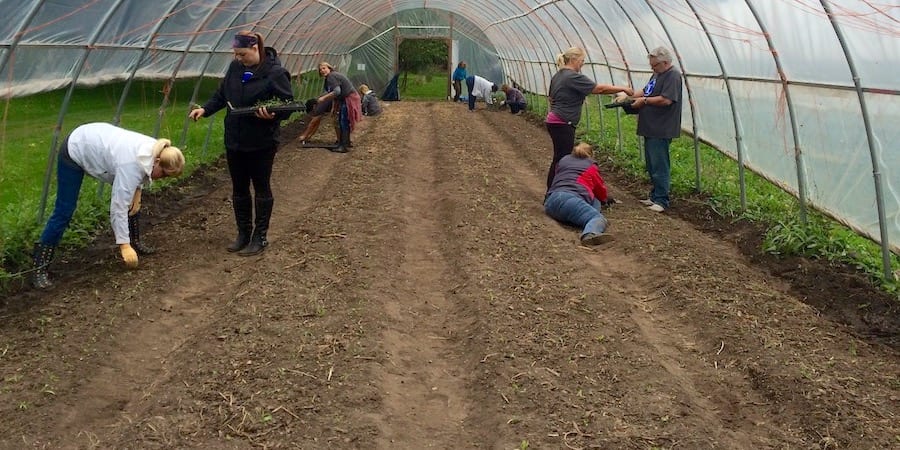
Leveraging lean thinking to build community prosperity
FEATURE – Riverview Gardens in an NGO striving to build prosperity for the community around it through capability development. The authors suggest this should be the goal for the lean community as a whole.
Words: Ben Hoseus, Director of SpreadProsperity.org; Kelly Nutty, Director of Resource Management at Riverview Gardens; and Jason Schulist, Vice President of Continuous Improvement at Appvion.
When people understand that they can learn and grow, they are able to move forward towards self-sufficiency. This is what Riverview Gardens, a non-profit organization operating on a repurposed executive golf club in Appleton, Wisconsin, has come to realize over time. The NGO strives to train transferable work skills for hundreds of people every year, while engaging the entire community in addressing the root causes of problems, such as unemployment, poverty, and homelessness through hard work and creativity. In doing so, it also hopes to change the community’s perception of people in need.
Indeed, Riverview Gardens’ mission is to “build dignity through job training and employment”. Upon completion of the organization’s 90-hour ServiceWorks job training program, participants earn a graduation certificate, gain a job reference, and become gainfully employed in a growing network of businesses. In designing this tailored program, Riverview Gardens has learned to take into account the fact that everybody has a different story to tell, and unique barriers to overcome to transform their lives. With 74% of graduated remaining employed three years after graduation (and around 250 people served each year), the program has proved a success.
One example of how Riverview Gardens is trying to change lives is the story of a gentleman named Tony. Following a number of bad choices, Tony enrolled in the ServiceWorks program knowing it was likely to be his last chance to get his life on the right path. While celebrating his graduation, he told peers, staff, and volunteers: "I'm thankful for this opportunity, it's shown me another way of life". Now a graduate of the program, Tony is returning to school to become a chef. Empowered with responsibility and hope, he has developed the confidence he needed to take control of his life.
The core idea behind the ServiceWorks program is for people to understand that they have something to contribute. It’s not that individuals don’t care about their future (an all-too-common assumption), but that they don’t anticipate they will have one. People experiencing such hardship often don’t think far past “today” and tend to act accordingly. Riverview Gardens hopes that participating in the program gives community members an opportunity to hope and build a growth mindset – and this is something that is fully echoed in the teachings of lean, which starts from the assumption that everyone, given the chance, wants to do a good job.
LEAN FOR THE COMMUNITY
The idea of benefitting the community, which guides Riverview Gardens’ work, is not new to the lean world. In fact, it dates back to the origins of the leanest of all companies, with Sakichi Toyoda, the founder of Toyota Automatic Loom Works, once saying: “The purpose of the company has always been twofold: to benefit society as well as the team members who make up the fabric of the company.”
At Toyota, there is a strong correlation between value creation and respect for people. In the book Toyota Culture, this is called Quality People Value Stream – which stretches from the recruitment stage to the employee’s complete identification with the company and commitment to serving the community. The Toyota Way of developing people has the underlying assumption that problem-solving capabilities are required in every role and at every level of the organization. When people solve problems, value is created not only for the customer, but also for the employee through their learning and growth. There is more: in The Toyota Way 2001, a core document in the company’s operational history, the fundamental principles of Respect for Humanity and Value Creation are articulated.
Toyota recognizes that value goes well beyond that of just the shareholders, extending to customers, associates, business partners, and the global community. Contributing to the economy and to society is a guiding principle for the company, a philosophy that became known as “long-term mutual prosperity” for all stakeholders.
While the idea of applying lean to transform communities is not new, it seems to be a rather neglected aspect of what this revolutionary methodology can achieve. We believe there is a huge opportunity there: as Riverview Gardens shows us, this model of “long-term mutual prosperity” can be practically extended outside of the business context and into the larger community. Their creation of value focuses on all members of a community, with the idea that “if every community member could learn and grow by being trained to solve problems, then all would be empowered to contribute to society.”
A VALUE STREAM OF HUMANITY
A core principle in most societies around the world (granted, followed to varying degrees of success) is to enable all people to learn and grow, regardless of their current situation. Just as Toyota extensively develops people throughout their employment, we propose to extend the scope of human development to society in its entirety. We like to call it “value streams of humanity”.
Organizations like Riverview Gardens remind us that there are many complex problems within our communities – homelessness, joblessness, drug addiction, and medical inability. In seeking to better understand and define the concept of value streams of humanity, we have discovered how much our thinking has to evolve. Perhaps the most important place to start is by changing the paradigm, by making the conscious effort to focus on what it would take to show a homeless person respect and empower them, rather than list the reasons and bad choices that might have led him or her to where they are. If members of society are “failing”, we should consider whether we have developed systems in which they can thrive. This is another important lean idea: we shouldn’t blame the person, but the process.
Building appropriate systems to empower all individuals to become contributing members of society (our target condition of collective empowerment) necessarily starts with making problems visible and agreeing on the principle of respect for all, regardless of social background. As we co-develop the community vision, we can then begin to countermeasure problems using PDCA experimentation. Many challenges will arise along the way, but we should stick to our underlying assumption that if we increase the flow of personal learning and growth, we will be able to problem-solve collaboratively and scientifically.
Our goal is to build on what Riverview Gardens and many others are doing, to form a network of practitioners with the common goal of fostering community impact (the focus of our collaboration is to facilitate the growth and sharing of knowledge). As we set out on this journey, we encourage the lean community to join us in the pursuit of long-term mutual prosperity.
THE AUTHORS



Read more


CASE STUDY – This Chilean agrobusiness company achieved great results in a very short time by applying lean to standardize its processes and improve its productivity. They are now berry fond of the methodology.


FEATURE – Can behaviors inspired by lean leadership help us to push back against our society’s ingrained racial bias? Our Brazilian colleagues discuss.


FEATURE – Teamwork, value stream mapping, 5S, kaizen – a former officer in the Dutch Special Forces reflects on how lean thinking is unconsciously embedded in Special Operations practices.


INTERVIEW – At the recent Lean Transformation Summit in New Orleans, we sat down with Richard Sheridan of Menlo Innovations to discuss the ground-breaking concept of joy in the workplace.

